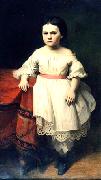China al por mayor de Marco de Oleo |
|||||||||||

|
|||||||||||
|
|
|
||||||||||||||
|
Johann Koler
(8 March 1826, in Vastemõisa near Suure-Jaani, Viljandi County, Estonia - 22 April 1899 in St. Petersburg, Russia) was an Estonian painter. He is considered to have been the first professional Estonian painter. He distinguished himself primarily by his portraiture and to a lesser extent by his landscape paintings. Some of his most notable pictures depict the Estonian rural life in the second half of the 19th Century. Johann Köler was the seventh child born to a peasant family. Despite the poverty of the parents Köler managed to attend the elementary and the district schools in Viljandi. Then he attended a workshop of master painters in Cesis (then in Livonia). In 1846, Köler travelled to St. Petersburg to work as a sign writer, where his talent was soon discovered. From 1848 to 1855 Johan Köler studied drawing and painting at the St. Petersburg Imperial Academy of Arts. During 1857 Köler travelled to Paris via Berlin, later returned to Germany then travelled to the Netherlands and Belgium. In 1858, he travelled across the Alps to Milan, Geneva, Florence and Rome. There, he studied in a private academy and devoted his time to watercolor technique. In Rome during 1859 he presented his composition "Christ on the Cross". Answering the call of the St. Petersburg Academy of Arts, Köler returned to the city in 1861. From 1862 to 1874 he was a teacher of the Grand Duchess Maria Aleksandrovna, the daughter of Czar Alexander II of Russia. In 1869-1870, he worked as a lecturer at the St. Petersburg Academy of Arts. From 1886 to 1889 Johan Köler worked in Vienna, Nice and Paris. |
||||||||||||||
|
|
||||||||||||||
|
||||||||||||||
|
|
||||||||||||||
| Johann Koler
(8 March 1826, in Vastemõisa near Suure-Jaani, Viljandi County, Estonia - 22 April 1899 in St. Petersburg, Russia) was an Estonian painter. He is considered to have been the first professional Estonian painter. He distinguished himself primarily by his portraiture and to a lesser extent by his landscape paintings. Some of his most notable pictures depict the Estonian rural life in the second half of the 19th Century. Johann Köler was the seventh child born to a peasant family. Despite the poverty of the parents Köler managed to attend the elementary and the district schools in Viljandi. Then he attended a workshop of master painters in Cesis (then in Livonia). In 1846, Köler travelled to St. Petersburg to work as a sign writer, where his talent was soon discovered. From 1848 to 1855 Johan Köler studied drawing and painting at the St. Petersburg Imperial Academy of Arts. During 1857 Köler travelled to Paris via Berlin, later returned to Germany then travelled to the Netherlands and Belgium. In 1858, he travelled across the Alps to Milan, Geneva, Florence and Rome. There, he studied in a private academy and devoted his time to watercolor technique. In Rome during 1859 he presented his composition "Christ on the Cross". Answering the call of the St. Petersburg Academy of Arts, Köler returned to the city in 1861. From 1862 to 1874 he was a teacher of the Grand Duchess Maria Aleksandrovna, the daughter of Czar Alexander II of Russia. In 1869-1870, he worked as a lecturer at the St. Petersburg Academy of Arts. From 1886 to 1889 Johan Köler worked in Vienna, Nice and Paris. 1865(1865) Medium Oil on canvas Dimensions 127.5 x 73.2 cm (50.2 x 28.8 in) cyf |
||||||||||||||
|
Related Paintings to Johann Koler :. |
||||||||||||||
|
|
||||||||||||||
|
|
||||||||||||||
|
CONTACTE EEUU |







